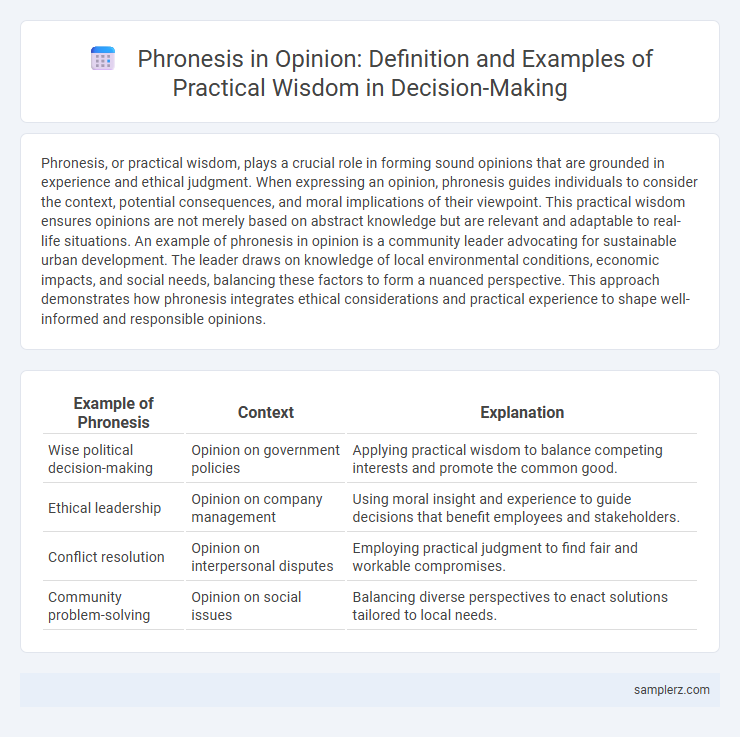Phronesis, or practical wisdom, plays a crucial role in forming sound opinions that are grounded in experience and ethical judgment. When expressing an opinion, phronesis guides individuals to consider the context, potential consequences, and moral implications of their viewpoint. This practical wisdom ensures opinions are not merely based on abstract knowledge but are relevant and adaptable to real-life situations. An example of phronesis in opinion is a community leader advocating for sustainable urban development. The leader draws on knowledge of local environmental conditions, economic impacts, and social needs, balancing these factors to form a nuanced perspective. This approach demonstrates how phronesis integrates ethical considerations and practical experience to shape well-informed and responsible opinions.
Table of Comparison
| Example of Phronesis | Context | Explanation |
|---|---|---|
| Wise political decision-making | Opinion on government policies | Applying practical wisdom to balance competing interests and promote the common good. |
| Ethical leadership | Opinion on company management | Using moral insight and experience to guide decisions that benefit employees and stakeholders. |
| Conflict resolution | Opinion on interpersonal disputes | Employing practical judgment to find fair and workable compromises. |
| Community problem-solving | Opinion on social issues | Balancing diverse perspectives to enact solutions tailored to local needs. |
Defining Phronesis: The Role of Practical Wisdom in Forming Opinions
Phronesis, or practical wisdom, plays a critical role in forming opinions by integrating ethical judgment with experiential knowledge. It enables individuals to evaluate situations contextually, balancing moral values and pragmatic considerations to arrive at well-reasoned viewpoints. This virtue emphasizes discernment and adaptability, guiding opinion formation beyond mere theoretical knowledge or personal bias.
Real-Life Applications: Everyday Examples of Phronesis in Decision-Making
Phronesis emerges in real-life decision-making when individuals weigh practical wisdom to balance competing interests, such as a manager prioritizing employee well-being while meeting business goals. In healthcare, doctors apply phronesis by tailoring treatment plans based on patients' unique circumstances beyond textbook protocols. These examples illustrate how phronesis guides ethical, context-sensitive judgments essential for effective problem-solving in everyday life.
How Phronesis Shapes Balanced Public Opinions
Phronesis, or practical wisdom, guides individuals to weigh diverse perspectives and relevant experiences when forming public opinions, promoting balanced and informed viewpoints. This virtue emphasizes contextual judgment and ethical considerations, reducing polarization by fostering empathy and critical thinking. Consequently, phronesis shapes public discourse into more nuanced and constructive conversations.
Phronesis vs. Bias: Distinguishing Wise Judgement from Prejudice
Phronesis, or practical wisdom, enables individuals to evaluate opinions based on ethical reasoning and situational awareness, distinguishing true insight from personal biases. Unlike prejudice, which stems from preconceived notions and emotional partiality, phronesis requires reflective judgment grounded in experience and moral values. This discernment fosters balanced decision-making that aligns with both individual integrity and communal well-being.
Case Study: Phronesis in Political Opinion Formation
Phronesis in political opinion formation is exemplified by leaders who balance ethical considerations with practical realities to craft policies that serve the common good. Case studies reveal how politicians apply experiential wisdom to navigate complex social issues, demonstrating prudence beyond theoretical knowledge. This practical judgment fosters trust and legitimacy, essential components in democratic decision-making processes.
Ethical Considerations: Phronesis in Controversial Social Issues
Phronesis in controversial social issues involves applying practical wisdom to navigate ethical dilemmas by balancing competing values such as justice, autonomy, and public welfare. For instance, in debates on climate change policy, phronesis guides decision-makers to consider scientific evidence, economic impacts, and social equity to formulate ethically sound actions. This approach ensures nuanced judgments that reflect contextual understanding rather than rigid adherence to ideology.
Fostering Phronesis: Educational Approaches to Opinion Development
Educational approaches to opinion development prioritize critical thinking exercises and real-world problem solving to foster phronesis, the practical wisdom enabling sound judgment. Incorporating diverse perspectives and reflective dialogue enhances students' ability to balance ethical considerations with contextual realities, a hallmark of phronesis. Case studies and experiential learning methods create environments where learners apply theoretical knowledge to nuanced social issues, strengthening their capability for prudent decision-making in opinion formation.
Phronesis in Leadership: Wise Opinions That Inspire Trust
Phronesis in leadership manifests through wise opinions that demonstrate practical wisdom, balancing ethical considerations with situational awareness. Leaders who exercise phronesis inspire trust by offering judgments grounded in experience and moral insight, fostering confidence among their teams. This blend of discernment and integrity encourages followers to embrace shared goals with conviction and resilience.
Media Literacy: Applying Phronesis to Analyze News and Information
Phronesis in media literacy involves critically evaluating news sources for credibility, bias, and accuracy to make informed judgments. Applying practical wisdom helps discern misleading information and fosters responsible consumption of media content. This ethical intelligence strengthens democratic participation by enabling individuals to navigate complex information landscapes effectively.
Cultivating Phronesis: Personal Strategies for Sound Opinion-Making
Cultivating phronesis in opinion-making involves deliberate reflection on diverse perspectives to develop practical wisdom tailored to specific contexts. Engaging in active listening and critical self-questioning enhances one's ability to balance ethical considerations with real-world complexities. Integrating experiential knowledge with theoretical insights fosters nuanced judgments that align with both personal values and societal well-being.

example of phronesis in opinion Infographic
 samplerz.com
samplerz.com